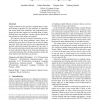Free Online Productivity Tools
i2Speak
i2Symbol
i2OCR
iTex2Img
iWeb2Print
iWeb2Shot
i2Type
iPdf2Split
iPdf2Merge
i2Bopomofo
i2Arabic
i2Style
i2Image
i2PDF
iLatex2Rtf
Sci2ools
OOPSLA
2009
Springer
2009
Springer
Typestate-oriented programming
Objects model the world, and state is fundamental to a faithful modeling. Engineers use state machines to understand and reason about state transitions, but programming languages provide little support for reasoning about or implementing these state machines, causing software defects and lost productivity when objects are misused. We propose Typestate-Oriented Programming as a natural extension to the object paradigm, where objects are modeled not just in terms of classes, but in terms of changing states. Each state may have its own representation and methods which may transition the object into a new state. A flow-sensitive, permission-based type system helps developers track which state objects are in. First-class typestates are ul abstraction that will help developers model and reuse objects more efficiently and correctly. Categories and Subject Descriptors D.3.1 [Programming Techniques]: Miscellaneous—Typestate-oriented programming; D.3.2 [Programming Languages]: Language Clas...
| Added | 27 May 2010 |
| Updated | 27 May 2010 |
| Type | Conference |
| Year | 2009 |
| Where | OOPSLA |
| Authors | Jonathan Aldrich, Joshua Sunshine, Darpan Saini, Zachary Sparks |
Comments (0)

